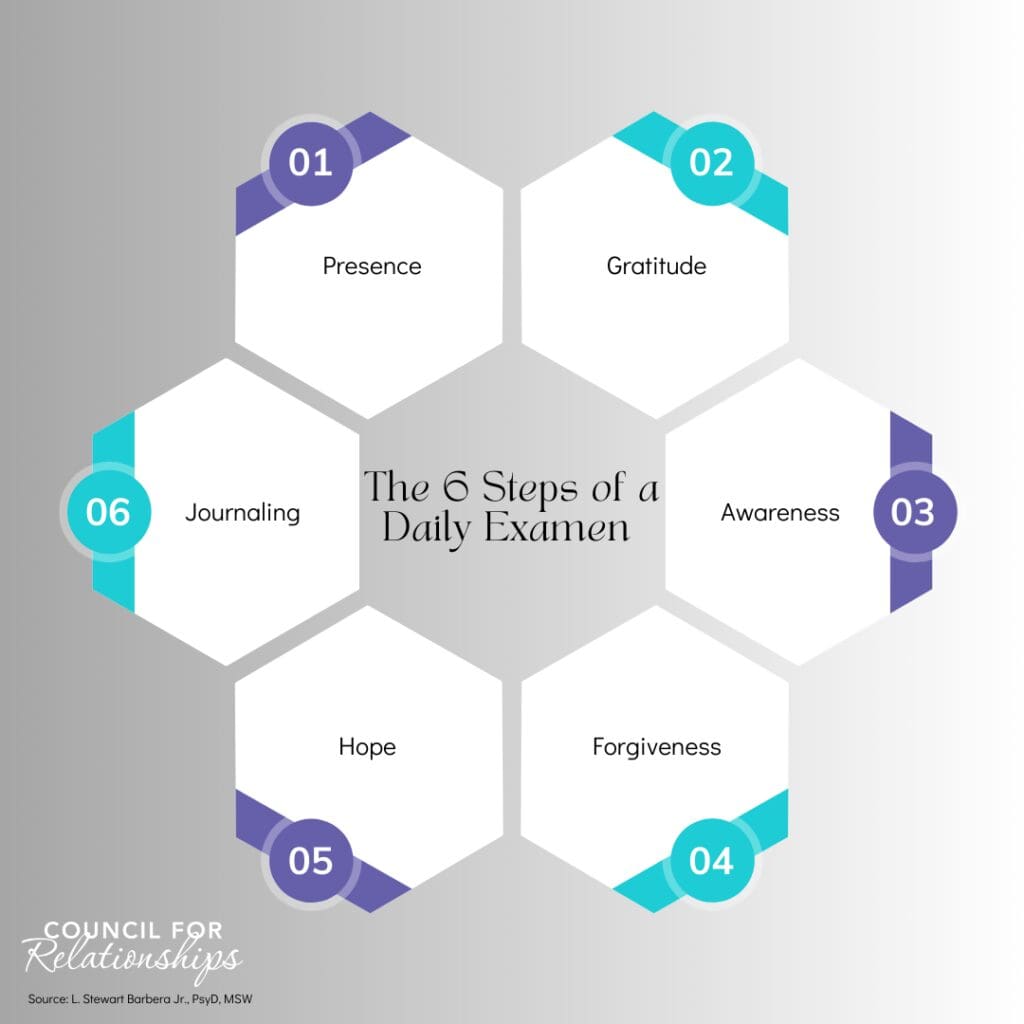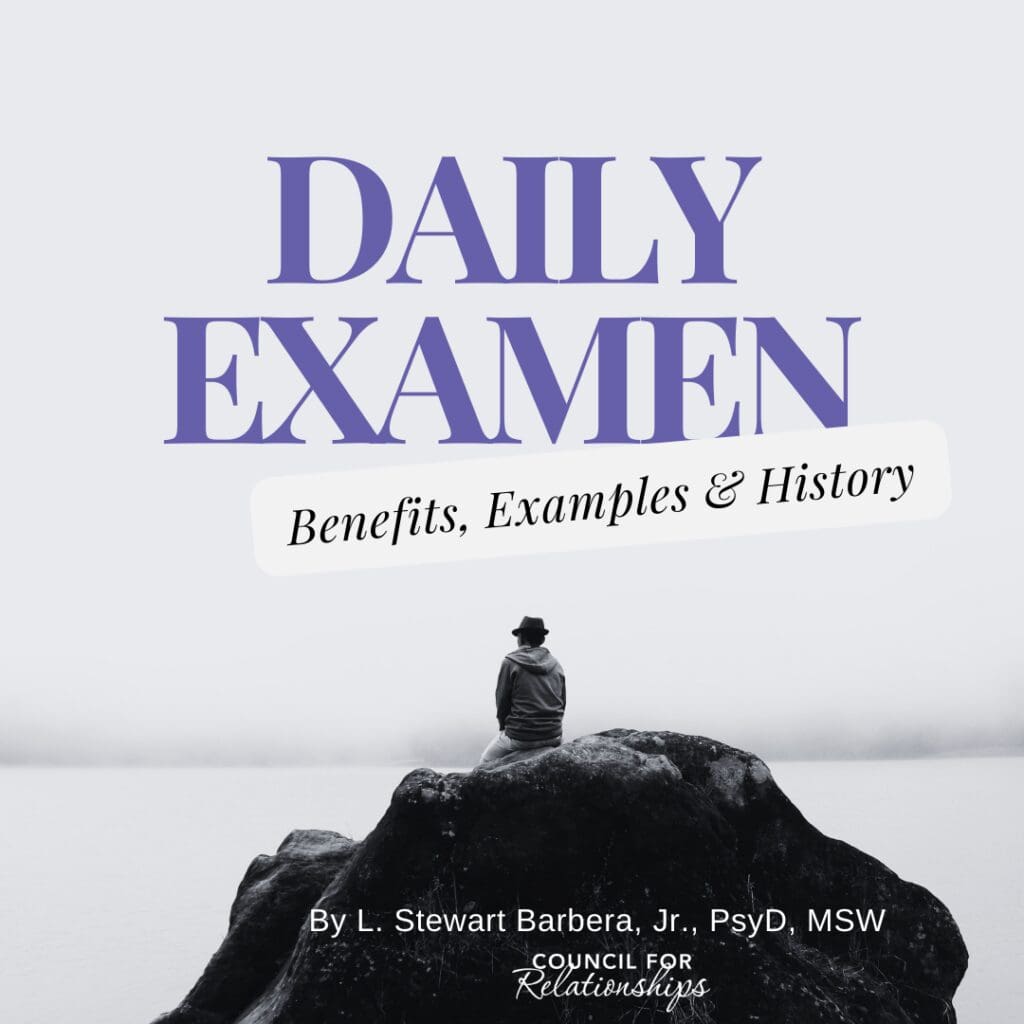Daily Examen: Benefits, Examples & History
The Daily Examen: A Brief Overview
St. Ignatius of Loyola, the founder of the Jesuits, developed the examen nearly five hundred years ago. Rooted in gratitude and love, the examen guides a person in reviewing their day. This review allows the person to look closer at the ebb and flow of their emotions and the significant moments.
This reflective prayer can help you notice when you experience something sacred in ordinary and special moments of your day. The examen may also help one identify ways to cultivate a greater sense of gratitude, hope, joy, love, and peace.
Over the past several decades, the examen has experienced a renaissance. Anyone can easily adapt and practice the examen, no matter their religion or spiritual beliefs, even though it started as a Christian prayer. For instance, Rabbi Laura Duhan-Kaplan described how she adapted the examen to fit her spirituality on her website. Spiritual seekers can adapt the examen for non-religious use, making it a truly inclusive practice.
The popularity of the examen continues to grow worldwide. Today, books, websites, and apps are available to introduce people to this spiritual exercise and guide their practice. Additionally, emerging research is studying the potential impact of the examen on enhancing emotional well-being.
Those who include the examen in their daily routine often find that it helps them become more aware of the sacred moments in their busy lives. Moreover, some people practice the examen to cultivate a sense of gratitude and potentially enhance their emotional well-being.
Benefits of Daily Examen
The examen offers numerous benefits, including its simplicity and flexibility. You can practice it anywhere in just a few minutes, reflecting on daily life experiences and larger social issues. The five-step process promotes mindfulness and spiritual growth and is adaptable to individual beliefs.
The examen is not onerous.
This meditation exercise takes just a few minutes to do. You can practice the examen anywhere and anytime, whether sitting at the kitchen table enjoying a morning coffee, commuting to or from work, or simply taking a walk, whenever you have a few minutes.
The examen focuses on what is happening in your life right here and now.
Since the examen is based on thoughtful prayer, it always gives you something to be thankful for, learn, a mistake to grow from, and hope for. While the five steps of the examen usually follow the same structure, the focus and themes can be endless. You can also use the examen to think about social justice topics like anti-racism, diversity, and the environment.
The examen is not complicated.
The daily examen comprises the following five movements, requiring you to focus on how each movement flows into the other:
- Presence
- Gratitude
- Awareness
- Forgiveness
- Hope
Presence
The examen starts by asking you to relax, focus, and recognize the presence of your kind and loving God. You can change the words of the examen to match what feels most comfortable and respectful for your spiritual beliefs.
Gratitude
The second step is gratitude. In this step, you reflect on your day and think about all the good and kind things that happened. This could be anything, big or small, that you’re thankful for, like a co-worker’s kindness, a meal with a family member or friend, a stranger’s kindness, or the beauty of nature.
Awareness
The third step of the examen is awareness. During this step, the person looks back over their day with their God and notices the ebb and flow of emotions that filled their day –those periods when they felt more fully alive, hopeful, joyful, loving, peaceful, and connected to the sacred (consolation) and other times during the day when they felt anxious, distressed or sad (feelings of desolation). The person also becomes aware of any meaningful moments that occurred.
Forgiveness
The fourth step of the examen is forgiveness. In this step, you reflect on your day and think about times when you weren’t your best self. Maybe you didn’t treat someone as well as you should have or missed a chance to show kindness. For these moments, you ask God for forgiveness.
Hope
The fifth step is hope. The person looks ahead at tomorrow and considers what gift or grace they need for the day ahead. The person asks their God for this gift.
Ways to Conclude Your Examen
Some people end their examen by showing reverence or taking a few deep breaths (similar to how some end their yoga practice by saying “Namaste”). However, finishing your examen with journaling lets you explore your experience more deeply.
Journaling
Some people find it helpful to reflect on their experience of taking the examen. For example, they might journal two or three things they were grateful for as they reflected on their day. They might also jot down a few words or sentences that capture what came up for them while they made the examen – perhaps a feeling that was particularly strong, a moment or interaction that was meaningful, or an idea, thought, or image that came up during the examen.

Infographic by Council for Relationships
A Step-by-Step Example of a Full Daily Examen
The daily examen is a five-step prayer practice that guides you through reflection on your day. Begin by centering yourself in God’s presence, then express gratitude, become aware of your emotions, seek forgiveness, and set hopeful intentions for the future. Optionally, journaling can enhance this reflective process as you spend time reflecting on your exam journey.
Daily Examen Step 1. Presence (1 minute)
Begin by centering yourself. Allow yourself to relax and to find stillness.
Take a few breaths. Focus on your breathing. Gently, call to mind that you are in the presence of your good and gracious God. Behold God, beholding you…and smiling as Rev. Anthony DeMello, SJ wrote.
Daily Examen Step 2. Gratitude (2 minutes)
Look back over your day. Recall the gifts and kindnesses that you received. Allow these gifts, both big and small, to come to mind.
Maybe you’re thankful for a text message you received, the kindness of a coworker or even a stranger, the time you spent with friends, a meal with family, a walk outside, watching the colors of the sunrise or sunset. Spend a few moments savoring these gifts.
Daily Examen Step 3. Awareness (4 minutes)
Now, ask your God to be with you as you look back over your day as if you were scrolling through pictures on your phone.
Start from the time you wake up. Ask yourself the following questions:
- What was your morning like?
- How did you feel?
- Were there times when you felt peaceful, joyful, happy, or full of life?
- Were there other times during the morning when you felt anxious, sad, stressed, or upset?
Next, look back on your afternoon in much the same way. Pay attention to your feelings. And do the same for the evening until you go to bed. As you look back on your day, do you notice anything that happened that was especially meaningful or important?
Finally, as you reflect on your day, did you notice the sacred – maybe in the stillness of nature, the busyness of your commute, family dinner, interactions at work, or any other time?
Daily Examine Step 4. Forgiveness (2 minutes)
The 4th step in your daily examen is forgiveness. Ask yourself: How did you treat others today? How did you treat yourself today? If there was a time when you weren’t your best self or missed an opportunity to be compassionate and loving, ask for forgiveness.
Daily Examine Step 5. Hope (1 minute)
Now, look at what is coming up in the day ahead. What is one gift or one grace that you need for tomorrow? Go ahead and ask your God for that now.
Finally, as you end your examen, you might say a brief prayer, signify reverence, or take a deep breath.
Daily Examine Step 6. Journaling (Optional step – 2-3 minutes)
Some people find that journaling after practicing the examen is helpful. Perhaps you might like to spend a few minutes reflecting on your examen. Write down 2-3 specific things you were grateful for as well as any feelings, insights, or situations that came to mind while you made the examen.
More Resources on the Daily Examen
For even more information on practicing a daily examen, check out the following books, podcasts, and apps:
- Book: A Simple, Life-Changing Prayer: Discovering the Power of St. Ignatius Loyola’s Examen by Jim Manney
- Book: Learning to Pray: A Guide for Everyone by James Martin
- Podcast: Young Adult Examen by Pray-As-You-Go.org
- App: Reimagining the Examen by Loyola Press

L. Stewart Barbera Jr. (pictured here) is a CFR Staff Therapist
About Philadelphia Therapist L. Stewart Barbera Jr.
L. Stewart Barbera Jr., PsyD, MSW, (he/him/his) is a Staff Therapist at Council for Relationships who sees individuals, couples, and families in Philadelphia and online. Contact him to request an appointment.
Are You Struggling with Your Mental Health?
Are you struggling with your mindfulness practice, experiencing anxiety, having hit a roadblock in your spiritual journey, or having other mental health issues? Let CFR’s over 85 individual, couples, and family therapy experts help you reduce stress and reach your goals. See our Therapist & Psychiatrist Directory for CFR therapists or psychiatrists near you.
If this is an emergency, please call 911 or contact the National Suicide Prevention Lifeline by dialing 988.
More Mental Health Blogs for Mindfulness Practices Similiar to a Daily Examen
CFR’s therapists, psychiatrists, and other mental health professionals offer much more to explore! Check out the CFR Expert Voices blog for great mental and emotional health advice on managing your anxiety, spirituality in the therapy room, improving your personal relationships, tips for healing from a traumatic experience, and much more. To get first access to our Expert Voices blog, join our mailing list!
Daily Temperature Reading – A Skill for Committed Relationships

